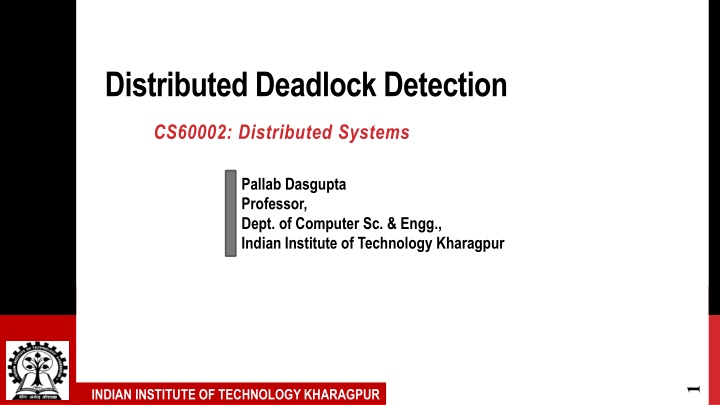
Distributed Deadlock Detection in Systems
"Explore distributed deadlock detection strategies, algorithms, and control organization in systems to ensure efficient resource handling and prevent potential deadlocks. Learn about centralized and distributed deadlock detection approaches implemented in the context of computer science and engineering at the Indian Institute of Technology, Kharagpur."
Download Presentation

Please find below an Image/Link to download the presentation.
The content on the website is provided AS IS for your information and personal use only. It may not be sold, licensed, or shared on other websites without obtaining consent from the author. If you encounter any issues during the download, it is possible that the publisher has removed the file from their server.
You are allowed to download the files provided on this website for personal or commercial use, subject to the condition that they are used lawfully. All files are the property of their respective owners.
The content on the website is provided AS IS for your information and personal use only. It may not be sold, licensed, or shared on other websites without obtaining consent from the author.
E N D
Presentation Transcript
Distributed Deadlock Detection CS60002: Distributed Systems Pallab Dasgupta Professor, Dept. of Computer Sc. & Engg., Indian Institute of Technology Kharagpur 1 INDIAN INSTITUTE OF TECHNOLOGY KHARAGPUR
Preliminaries The System Model The system has only reusable resources Processes are allowed only exclusive access to resources There is only one copy of each resource Resource vs. Communication Deadlocks A Graph-Theoretic Model Wait-For Graphs 2 INDIAN INSTITUTE OF TECHNOLOGY KHARAGPUR
Deadlock Handling Strategies Deadlock Prevention Deadlock Avoidance Deadlock Detection 3 INDIAN INSTITUTE OF TECHNOLOGY KHARAGPUR
Issues in Deadlock Detection & Resolution Detection Progress: No undetected deadlocks Safety: No false deadlocks Resolution 4 INDIAN INSTITUTE OF TECHNOLOGY KHARAGPUR
Control Organization for Deadlock Detection Centralized Control Distributed Control Hierarchical Control 5 INDIAN INSTITUTE OF TECHNOLOGY KHARAGPUR
Centralized Deadlock-Detection Algorithms The Completely Centralized Algorithm The Ho-Ramamoorthy Algorithms The Two-Phase Algorithm The One-phase Algorithm 6 INDIAN INSTITUTE OF TECHNOLOGY KHARAGPUR
Distributed Deadlock-Detection Algorithms A Path-Pushing Algorithm The site waits for deadlock-related information from other sites The site combines the received information with its local TWF graph to build an updated TWF graph For all cycles EX -> T1 -> T2 -> Ex which contains the node Ex , the site transmits them in string form Ex, T1, T2, Ex to all other sites where a sub- transaction of T2 is waiting to receive a message from the sub-transaction of T2 at that site 7 INDIAN INSTITUTE OF TECHNOLOGY KHARAGPUR
Chandy et al.s Edge-Chasing Algorithm To determine if a blocked process is deadlocked if Pi is locally dependent on itself then declare a deadlock else for all Pj and Pk such that (a) Pi is locally dependent upon Pj, and (b) Pj is waiting on Pk, and (c) Pj and Pk are on different sites, send probe (i, j, k) to the home site of Pk 8 INDIAN INSTITUTE OF TECHNOLOGY KHARAGPUR
Algorithm Contd.. On the receipt of probe (i, j, k), the site takes the foll. actions: if (a) Pk is blocked, and (b) dependentk(i) is false, and (c) Pk has not replied to all requests of Pj, then begin dependentk(i) = true; if k = i then declare that Pi is deadlocked else for all Pm and Pn such that (i) Pk is locally dependent upon Pm, and (ii) Pm is waiting on Pn, and (iii) Pm and Pn are on different sites, send probe (i, m, n) to the home site of Pn end. INDIAN INSTITUTE OF TECHNOLOGY KHARAGPUR 9
Other Edge - Chasing Algorithms The Mitchell Merritt Algorithm Sinha Niranjan Algorithm 10 INDIAN INSTITUTE OF TECHNOLOGY KHARAGPUR
Chandy et al.s Diffusion Computation Based Algo Initiate a diffusion computation for a blocked process Pi: send query (i, i, j) to each process Pjin the dependent set DSi of Pi; numi (i) := |DSi|; waiti(i):= true When a blocked process Pk receives a query (i, j, k): if this is the engaging query for process Pk then send query (i, k, m) to all Pm in itsdependent setDSk; numk(i) := |DSk|; waitk(i) := true else if waitk(i) then send a reply (i, k, j) to Pj. 11 INDIAN INSTITUTE OF TECHNOLOGY KHARAGPUR
Chandy et al.s Algo. Contd. When a process Pk receives a reply (i, j, k): if waitk(i) then begin numk (i) := numk(i) 1; if numk (i) = 0 then if i = k then declare a deadlock else send reply (i, k, m) to the process Pmwhich sent the engaging query 12 INDIAN INSTITUTE OF TECHNOLOGY KHARAGPUR
A Global State Detection Algorithm waiti : boolean (:= false) /* records the current status */ ti :integer (:= 0) /* current time */ in (i) : set of nodes whose requests are outstanding at i out (i) : set of nodes on which i is waiting pi : integer (:= 0) /* number of replies required for unblocking */ wi : real (:= 1.0) /* weight to detect termination of deadlock detection algorithm */ 13 INDIAN INSTITUTE OF TECHNOLOGY KHARAGPUR
A Global State Detection Algorithm REQUEST_SEND (i): /*executed by node i when it blocks on a pi-out of-qi request */ For every node j on which i is blocked do out (i) out (i) U {j}; send REQUEST (i) to j; set pi to the number of replies needed; waiti := true REQEST_RECEIVE (j): /* executed by node i when it receives a request made by j */ in (i) in (i) U {j}; REPLY_SEND (j): /* executed by node i when it replies to a request by j */ in (i) in (i) - {j}; send REPLY (i) to j; 14 INDIAN INSTITUTE OF TECHNOLOGY KHARAGPUR
A Global State Detection Algorithm (Contd..) REPLY_RECEIVE (j): /*executed by node i when it receives a reply from j to its request if valid reply for the current request then begin out(i) out (i) {j}; pi pi 1; if pi = 0 { waiti false; For all k out (i), send CANCEL (i) to k; out(i) } end CANCEL_RECEIVE (j): /* executed by node i when it receives a cancel from j */ if j in (i) then in (i) in (i) - {j}; 15 INDIAN INSTITUTE OF TECHNOLOGY KHARAGPUR
The Algorithm FLOOD, ECHO and SHORT control messages use weights (for termination detection). Data structures: LS: array [1..N] of record consisting of: LS[init].out /* nodes on which i is waiting in snapshot */ LS[init].in /* nodes waiting on i in the snapshot */ LS[init].t /* time when init initiated snapshot */ LS[init].s /* local blocked state as seen by snapshot */ LS[init].p /* value of pi as seen in snapshot */ 16 INDIAN INSTITUTE OF TECHNOLOGY KHARAGPUR
The Algorithm The distributed WFG is recorded using FLOOD messages in the outward sweep and is examined for deadlocks using ECHO messages in the inward sweep Blocked nodes propagate the FLOOD Active nodes initiate reduction with ECHO messages A node is reduced if it receives ECHOs along piout of its qi outgoing edges When an ECHO arriving at a node does not unblock the node, its weight is sent directly to the initiator using a SHORT message If initiator is not reduced but termination is detected, then we have a deadlock 17 INDIAN INSTITUTE OF TECHNOLOGY KHARAGPUR
The Algorithm SNAPSHOT INITIATE /* Executed by node i to detect whether it is deadlocked */ init i ; wi 0; LS[init].out LS[init].in LS[init].t LS[init].s LS[init].p send FLOOD(i, i, ti, 1 / |out(i)|) to each j in out(i). out(i) ; 0; ti ; true ; pi ; 18 INDIAN INSTITUTE OF TECHNOLOGY KHARAGPUR
The Algorithm FLOOD_RECEIVE(j, init, t_init, w) /* Executed by node i on receiving a FLOOD message from j */ LS[init].t < t_init j in(i) /* valid FLOOD, new snapshot */ LS[init].out out(i) ; LS[init].in { j }; LS[init].t t_init ; LS[init].s waiti ; waiti = true LS[init].p pi ; send FLOOD(i, init, t_init, w / |out(i)|) to each k in out(i). waiti = false LS[init].p 0 ; send ECHO(i, init, t_init, w) to j. LS[init].in LS[init].in { j } 19 INDIAN INSTITUTE OF TECHNOLOGY KHARAGPUR
The Algorithm FLOOD_RECEIVE(j, init, t_init, w) /* Contd. */ LS[init].t < t_init j in(i) /* invalid FLOOD, new snapshot */ send ECHO(i, init, t_init, w) to j. LS[init].t = t_init j in(i) /* invalid FLOOD, curr snapshot */ send ECHO(i, init, t_init, w) to j. LS[init].t = t_init j in(i) /* valid FLOOD, current snapshot */ LS[init].s = false send ECHO(i, init, t_init, w) to j ; LS[init].s = true LS[init].in LS[init].in U { j } ; send SHORT(init, t_init, w) to init. INDIAN INSTITUTE OF TECHNOLOGY KHARAGPUR 20
The Algorithm ECHO_RECEIVE(j, init, t_init, w) LS[init].t > t_init discard the ECHO message LS[init].t < t_init cannot happen echo for unseen snapshot LS[init].t = t_init /* ECHO for current snapshot */ LS[init].out LS[init].s = false LS[init].s = true LS[init].out { j } ; send SHORT(i, init, t_init, w) to init ; LS[init].p LS[init].p 1 ; LS[init].p = 0 LS[init].s false ; init = i declare not deadlocked; exit; send ECHO(i, init, t_init, w / |LS[init].in|) to k LS[init].in LS[init].p 0 send SHORT(i, init, t_init, w) to init ; 21 INDIAN INSTITUTE OF TECHNOLOGY KHARAGPUR
The Algorithm SHORT_RECEIVE(init, t_init, w) t_init < t_blocki discard the message (outdated) t_init > t_blocki not possible t_init = t_blocki LS[init].s = false discard t_init = t_blocki LS[init].s = true wi wi + w ; wi = 1 declare deadlock and abort. 22 INDIAN INSTITUTE OF TECHNOLOGY KHARAGPUR


















